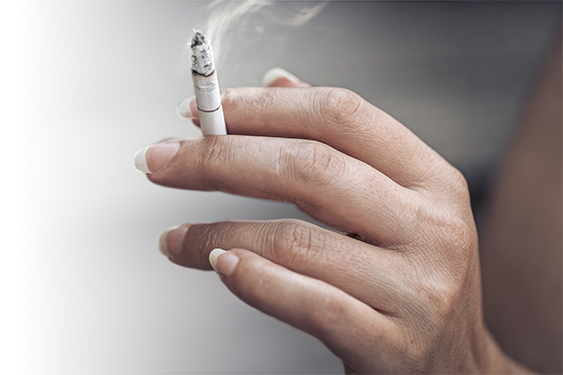Passive smoking or exposure to second-hand smoke can have harmful effects on everyone’s health. For your and your loved ones' well-being, quit smoking this year!
Second-hand smoke: basic notions
Tobacco smoke is one of the main sources of air pollution that we breathe. It contains a complex mixture of thousands of chemicals. Inhaled by both smokers and the people around them, it causes more deaths than all other sources of air pollution.
There are two forms of smoke: primary and secondary. The primary form is the smoke inhaled directly by the smoker and then exhaled. The second form is the smoke that emanates directly from the burning cigarette between puffs, and that is inhaled by people near the smoker and by the smoker him/herself. The smoke that results from incomplete combustion at low temperature is even more toxic than the one inhaled and exhaled by the smoker.
Fortunately, changes in our society, medical knowledge, and the implementation of effective government initiatives have contributed to a significant decrease in smoking, and consequently, to exposure to second-hand smoke.
The effects of passive smoking on the general population
The effects of passive smoking on health are now more widely known. In addition to being very unpleasant for non-smokers (unpleasant smell, irritating cough, difficulty breathing, lacrimation, etc.), tobacco smoke can affect the health of people of all ages. Passive smoking is linked to a significant increase of the risk of lung cancer and other types of cancer (e.g., breast cancer or sinus cancer).
It also increases the risk of cardiovascular diseases (such as coronary heart disease, myocardial infarction and cerebrovascular accident or stroke), and respiratory diseases (asthma, emphysema, and chronic bronchitis, in particular).
Some individuals are more vulnerable to the effects of second-hand smoke. For example, this is true for the elderly and for individuals suffering from chronic diseases.

The effects of passive smoking in babies and young children
Studies have shown that young children are particularly sensitive to the effects of passive smoking. Because their respiratory system is smaller and their immune system is less developed, they would have a higher risk of suffering from respiratory problems, including asthma and infections (bronchitis and pneumonia, for example). The risk of otitis (ear infection) is also increased. Additionally, young children breathe faster than adults; consequently, they breathe in more harmful chemicals in proportion to their weight. Parents and other individuals in the child's environment must abstain from smoking in the presence of babies and children.
The effects of passive smoking in pregnant women and women who breastfeed
During pregnancy, the risks of active smoking for the development and health of the foetus are well-known. There is also a connection between exposure by a non-smoking mother to tobacco smoke, and the risk of decreased foetal growth and low birth weight. Therefore, pregnant women must avoid any exposure to tobacco smoke.
This also goes for women who are breastfeeding, since the nicotine contained in tobacco passes through breast milk and can harm the baby's health.
It's everyone's business!
We all have a role to play in the fight against smoking and the harmful emissions that result from it. We must encourage smokers to quit or at least to require that they smoke only in designated areas. It is also important to discourage young people from trying it.
Here are a few tips on how to reduce the harmful effects of second-hand smoke, if you smoke:
- Never smoke in the presence of pregnant women, babies, children or people with a medical condition.
- Make it a habit to smoke outside.
- Respect the wishes of non-smokers who do not want to be inconvenienced by tobacco smoke.
If you are a non-smoker:
- Don’t allow people to smoke in your home or family car.
- Stay away from areas where smoking is allowed, since the chemicals contained in second-hand smoke remain for a long time on surfaces that are exposed to it.
- Don't be too tough on smokers; instead, focus on your health.
For additional information about the risks related to passive smoking or to develop an effective action plan to quit smoking for good, speak to your pharmacist, who will be glad to help, guide, and encourage you.

